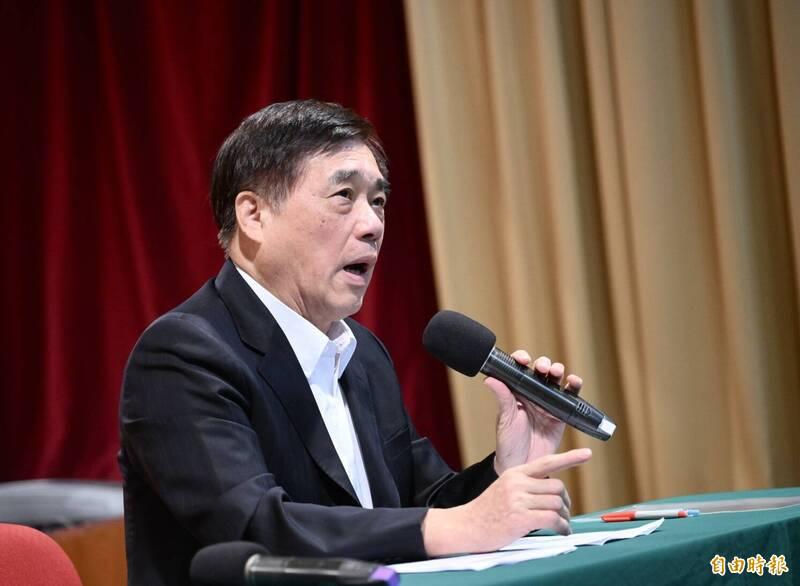Chinese Nationalist Party (KMT) chair candidate Hau Lung-bin (郝龍斌) today said he would call on Beijing to acknowledge the existence of the Republic of China (ROC) and declare it would not use force if Taiwan does not declare independence.
Hau, former Taipei mayor, held a press conference today on cross-strait policy, announcing how he would lead the KMT’s approach to cross-strait relations.

Photo: Lo Pei-de, Taipei Times
Hau called for an internal party debate on cross-strait policy, establishing KMT offices in Beijing and Shanghai, expanding the Twin City Forum involving Taipei and Shanghai into a cross-strait forum and ensuring that the party’s policy adheres to the ROC’s constitution.
Good cross-strait relations require effort from both sides, Hau said.
Currently, the biggest obstacle to peace and stability in the Taiwan Strait is China’s repeated military drills and continuous air and naval incursions around Taiwan, he said.
If he is elected KMT chair, he would call on China to declare that it would not use force against Taiwan as long as Taiwan does not seek independence, Hau said.
Hau did not elaborate on how he would ensure China’s commitment to this “no independence, no force” agreement, but emphasized that in his talks with Chinese leaders, he speaks sincerely about promoting cross-strait exchanges and peace, rather than simply flattering them.
Hau said he would reorient the KMT’s cross-strait policies to align with the ROC Constitution, which interprets the cross-strait relationship as the relationship between ROC in Taiwan and ROC in the mainland region, rather than two separate nations.
Hau said the constitution is Taiwan’s best protection and legal connection between the two sides of the strait, criticizing President William Lai’s (賴清德) erroneous presentation of cross-strait relations and the relationship between Taiwan and the ROC.
He said that Beijing must acknowledge the reality of the ROC’s current existence. If not, the “most natural and reasonable” legal link between the two sides of the strait will dwindle.
The people of Taiwan can only feel protected if the ROC is acknowledged and respected, and only then can they rationally work towards goals beneficial to people on both sides of the Strait, while continuing to preserve their democratic way of life, he said.
Hau emphasized that the “one China” referenced in the “1992 consensus” refers to the ROC.
The “1992 consensus” is a term former Mainland Affairs Council chairman Su Chi (蘇起) in 2006 admitted making up in 2000. It refers to a tacit understanding between the KMT and the Chinese government that both sides of the Taiwan Strait acknowledge there is “one China,” with each side having its own interpretation of what “China” means.
If China wishes for cross-strait exchanges based on the “1992 consensus,” it must first respect the ROC’s existence, Hau said.

UNILATERAL MOVES: Officials have raised concerns that Beijing could try to exert economic control over Kinmen in a key development plan next year The Civil Aviation Administration (CAA) yesterday said that China has so far failed to provide any information about a new airport expected to open next year that is less than 10km from a Taiwanese airport, raising flight safety concerns. Xiamen Xiangan International Airport is only about 3km at its closest point from the islands in Kinmen County — the scene of on-off fighting during the Cold War — and construction work can be seen and heard clearly from the Taiwan side. In a written statement sent to Reuters, the CAA said that airports close to each other need detailed advanced

Tropical Storm Fung-Wong would likely strengthen into a typhoon later today as it continues moving westward across the Pacific before heading in Taiwan’s direction next week, the Central Weather Administration (CWA) said. As of 8am, Fung-Wong was about 2,190km east-southeast of Cape Oluanpi (鵝鑾鼻), Taiwan’s southernmost point, moving westward at 25kph and possibly accelerating to 31kph, CWA data showed. The tropical storm is currently over waters east of the Philippines and still far from Taiwan, CWA forecaster Tseng Chao-cheng (曾昭誠) said, adding that it could likely strengthen into a typhoon later in the day. It is forecast to reach the South China Sea

Almost a quarter of volunteer soldiers who signed up from 2021 to last year have sought early discharge, the Legislative Yuan’s Budget Center said in a report. The report said that 12,884 of 52,674 people who volunteered in the period had sought an early exit from the military, returning NT$895.96 million (US$28.86 million) to the government. In 2021, there was a 105.34 percent rise in the volunteer recruitment rate, but the number has steadily declined since then, missing recruitment targets, the Chinese-language United Daily News said, citing the report. In 2021, only 521 volunteers dropped out of the military, the report said, citing

WEATHER Typhoon forming: CWA A tropical depression is expected to form into a typhoon as early as today, the Central Weather Administration (CWA) said yesterday, adding that the storm’s path remains uncertain. Before the weekend, it would move toward the Philippines, the agency said. Some time around Monday next week, it might reach a turning point, either veering north toward waters east of Taiwan or continuing westward across the Philippines, the CWA said. Meanwhile, the eye of Typhoon Kalmaegi was 1,310km south-southeast of Oluanpi (鵝鑾鼻), Taiwan’s southernmost point, as of 2am yesterday, it said. The storm is forecast to move through central